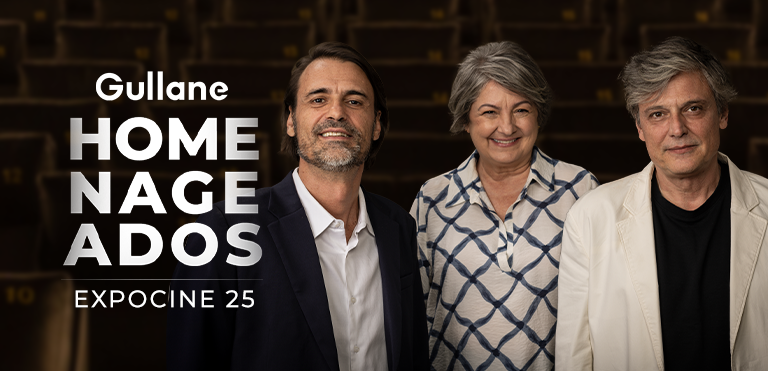Fabiano Gullane and Caio Gullane talk about the tribute to the producer that will take place at Expocine 2025
When we think of Brazilian production companies, it's impossible to leave Gullane out of the conversation. About to turn 30, the production company boasts a wealth of recent critical and commercial successes. In addition to classics like Carandiru and Que Horas Ela Volta? , the current momentum is also looking quite promising. Last year, for example, the production company took Motel Destino to the Cannes , released Arca de Noé , considered the most important Brazilian animated film, and the series Senna became the biggest series produced in South America. To top it all off, the documentary Milton Bituca Nascimento (Gullane+) was a critical success in 2025. These are just some of the achievements that led Gullane to be honored at EXPOCINE 25 in the production category.
Recognized as one of the largest Brazilian audiovisual production companies since its founding in 1996, Gullane has produced over 100 feature films and series, and has won over 500 awards and been selected at festivals such as Cannes, Venice, Berlin, and Sundance. To celebrate the production company's milestone, Fabiano Gullane and Caio Gullane reviewed their entire success story, recalling the challenges, perseverance, and the importance of unity among all links in the audiovisual chain. They also highlighted the importance of the recognition granted at Expocine 25 and the event's relevance to the market.
Continuing the interviews with Expocine , Portal Exibidor spoke with the duo, who analyzed the market as a whole, even addressing the importance of internationalizing Brazilian works and the need for streaming regulation. It's worth noting that, while some questions were asked by our editorial team, part of the interview was taken from the OdeioCinema podcast AdoroCinema group and Tonks , the conglomerate that owns the rights to Expocine and Portal Exibidor .
"When we chose film, it was a bold choice because it was the early 1990s, with a huge recession for Brazilian filmmaking and the closure of Embrafilme, so we had to persevere. Soon after, our friends who also worked in film became interested in making TV commercials, and commercials were a very thriving market at the time. By nature, we were never interested and insisted on doing what we now call content, which was making films. This was a very wise choice, and we've been working on it for 30 years," summarized Caio about the production company's founding.
The brothers' connection with film and audiovisual began when they were still young, with Fabiano working in dubbing and sound editing, while Caio worked as an actor and clown performing. Audiovisual quickly sparked the duo's interest, and they enrolled in film school at FAAP. Due to the aforementioned recession, the beginning wasn't easy. However, with perseverance, Fabiano and Caio found a path to pursuing their dreams in short film production.
"We went through all kinds of difficulties and trials. We had to double down on our commitment to truly pursuing this career, and we were incredibly resilient because of the many 'no's' and closed doors, but we never abandoned our dream of making a living from film. Given this, I wanted to leave a first message: don't give up, because it's really hard, and a second, because in college everyone wants to direct, and there's no one left for other roles. Audiovisual isn't just about directing, and there are many beginnings, such as editor, director of photography, and soundtrack writing. There are many wonderful careers in film. Furthermore, anyone's first steps are in short films. You can't take shortcuts, and it's important to experiment, fail, succeed, and be ambitious with your short. Before making our first feature, we made 15 or 16 shorts, and that's where you learn without so much pressure," Fabiano emphasized.
These setbacks, in fact, helped Gullane explore different worlds and gain experience, resulting in a diverse catalog of animated films, series, and feature films, among others. Caio also emphasized that the production company has pursued an entrepreneurial path, but always prioritizes creative and artistic productions. The executive stated that Gullane doesn't "embark" on any project it doesn't believe in artistically, but, most importantly, doesn't embrace projects that don't have a clearly defined "finish line." Thus, Gullane remains constantly aware of market trends and developments.
"We've gone from being cinema warriors to becoming successful entrepreneurs in the audiovisual sector. This demonstrates the maturity of the Brazilian market and independent markets around the world, which are increasingly taking over their domestic markets, with each country increasingly trying to export its audiovisuals. So, along with the artistic quality and relevance of the works, there must be organization to compete professionally and at a high level," Fabiano added, already introducing the importance of internationalization.
In fact, around 80% of productions consumed worldwide are in English. This obviously hinders the internationalization of Brazilian works, as these and productions in other languages from around the world compete for only a 20% market share. Given this scenario, Gullane 's missions is to closely monitor the market to bring its ideas, messages, and reflections to the entire world, not just Brazil.
These messages and reflections, in fact, are important for preserving memories and history through audiovisual media. For the duo, cinema is also a place of education and culture, going far beyond mere entertainment and helping to ennoble and shape the opinions of the public as a whole. Carandiru , in fact, is an example of this role of audiovisual media.
"With cinema and audiovisual media, we revisit, preserve, and safeguard the memory and pride of the things and stories we've experienced. 'Carandiru' is an example that many generations may not even know what it is, but it was one of the most violent and overcrowded prisons in the world, where one of the most serious massacres took place, and we have this story to tell and shape memory. People will know this happened, and 'Carandiru' is a practical example of the importance and relevance of cinema and audiovisual media in any country or place in the world," reflected Fabiano.
During the conversation, Fabiano also emphasized that knowing how to market and distribute films is just as important as producing them. In the early years of Gullane , the executive realized that the market lacked the importance it deserved for distribution and marketing, and recognizing this gap, the production company entered the market to fill this space and forge its own path to success.
"We already had the impetus to produce and decided to combine it with at least one attempt to go to festivals, try to get distribution, and find a path for the film to be completed and released to the world. With 'Bicho de Sete Cabeças,' for example, we started with nothing and added an Italian co-production, Sony to distribute, added festivals, and went to Toronto and many other festivals, and the film became a success. Gullane was born that way, and we entered the film industry because we saw that it needed effort and lacked people with the intensity and artistic intention to produce, and that's where a path was created," he said.
Addressing the market as a whole, Caio also stated that, although Brazil has one of the most celebrated public policies for the audiovisual sector in recent decades, adjustments are needed, particularly regarding streaming regulation. He emphasized that several countries have already gone through this process, and it is essential that Brazil also establish rules for international content creators to follow.
"We're living in an interesting moment in Brazil. On the one hand, we have development and incentive policies, and on the other, we have platforms eagerly looking to Brazil, because it's a continental country with a very large audience. Discussions between these sectors are unproductive because we're the same sector, and at Gullane, we'll produce both independent films and series and those for platforms. This is a universal trend; we have some projects underway, and we're present in this discussion, which is very important to us. We have rules and laws that our country establishes, and we work within them, but it's important that international institutions and content creators also adapt to the rules," he stated.
Finally, using a movie theater they frequented in São Simão, in the interior of São Paulo, as a reference when they were young, Caio and Fabiano also expressed their desire to work as exhibitors in the future. For them, in a small town, for example, a movie theater can have a mixed use, serving as a theater, for debates, and even as an auditorium for events that promote cultural dissemination.
"Audiovisual is a whole, and we participate in creation, financing, production, release, promotion, and we're eager to participate in exhibition as well. The darkroom and the big screen—with all due respect to the other screens we also work hard on—but the movie screen and the experience of being focused solely on that story are unparalleled. We used to go to Cine Oásis in São Simão, and we have that desire. Cinema is a place for ritualizing in the darkroom and a meeting place. It's an activity that is complete when it reaches the audience, and we understand cinema as a place of education and culture as well," Fabiano emphasized before reflecting on the leading role Brazil should assume in the production and distribution market. "Brazil is one of the world's leading audiovisual producers. It's number two on Netflix, number two on HBO, and we're among the top five or eight highest-grossing films in the world. We generate enormous wealth as a consumer market and are key players in this market, but we're tired of not being key players in the production and distribution market," he concluded.
EXPOCINE 25
Gullane being the big honoree at EXPOCINE 25 in the production segment, the production company's own history already showed that success was only a matter of time. Despite the challenges, Bicho de Sete Cabeças Gullane 's first film , proved ahead of its time simply by exploring the possibility of international co-production with professionals from other countries in the early 2000s. Furthermore, the film won several national and international awards, demonstrating the enormous potential of what was emerging.
Today, despite their successful trajectory, the Gullane brothers still encounter challenges within the independent audiovisual market, ranging from bureaucratic issues to the lack of predictability in our public policies, and the ever-present challenge of attracting Brazilian audiences to see Brazilian works in theaters. However, thanks to their perseverance, optimism, and resilience in pursuing a dream, the production company was honored at the largest event dedicated to the film market in Latin America.
Nowadays, Brazil has established itself as one of the main audiovisual consumption markets in the world, and in the duo's view, Expocine emerges precisely as an essential space for discussing this enormous market.
"How can we continue to grow as a major consumer market? How can we attract more moviegoers? How can we further increase our viewership on streaming platforms and in the digital world? How can we create successful intellectual properties that remain under the control of the national industry? Expocine is a great opportunity for our market to analyze our past, plan and act in the present, and build and refine our future," emphasize Fabiano and Caio.
The brothers also made a point of highlighting the strategic importance of Expocine in bringing together the entire audiovisual chain (production, distribution and exhibition), and also highlighted the crucial role the event plays in defending the cinema window.
For Gullane, being honored by Expocine 2025 is an indescribable honor. We are thrilled, happy, and satisfied with this recognition. We have dedicated nearly 30 years to Brazilian audiovisual production, working on several fronts, including: developing our industry, stories, and talent; collaborating in the creation of production mechanisms; collaborating in the structuring of public policy to regulate and promote the audiovisual market in Brazil; conquering the Brazilian market by attracting and building partnerships with distributors, television stations, and streaming platforms; always striving to include Brazilian audiovisual works in major international festivals, co-productions, and the competitive international sales market, among many other responsibilities and challenges. This entire trajectory is recognized in this tribute. On behalf of Debora Ivanov, Caio Gullane, Fabiano Gullane, and all our collaborators—directors, co-producers, screenwriters, and actresses—
Finally, the partners also emphasized that Gullane remains deeply committed to Brazilian cinema, investing increasingly in the stories Brazil wants to see and the films Brazil wants to tell. The focus is now on major projects with ambitions for both the domestic and international markets. The production company's future catalog includes films by renowned filmmakers such as Cao Hamburger, Roberto Santucci, Laís Bodanzky, Karim Ainouz, Viviane Ferreira, Sandra Kogut, Sabrina Fidalgo, Sérgio Machado, and others. Therefore, Gullane aims to increasingly establish itself as a leading audiovisual creator and producer, combining artistic quality with commercial relevance, always prioritizing authentically Brazilian stories that have the potential to reach global audiences.
"We also want to highlight the growth of Gullane+, our distribution division led by Debora Ivanov. We are firmly convinced that, in this first phase of Gullane+'s presence in the market, our main focus is Brazilian content distributed in Brazil and around the world, with projects such as 'Rio do Desejo' by Sérgio Machado, 'Milton Bituca Nascimento' by Flavia Moraes, '3 Obás de Xangô' by Sérgio Machado, 'Para Vigo Me Voy' by Lírio Ferreira and Karen Harley, 'O Projeto' by Sabrina Fidalgo, and many others. We believe that Brazil has all the conditions to be a global player in the audiovisual industry, and Gullane wants to be at the forefront of this transformation," concluded Caio and Fabiano.


